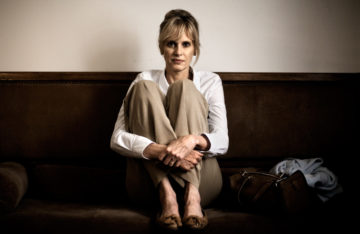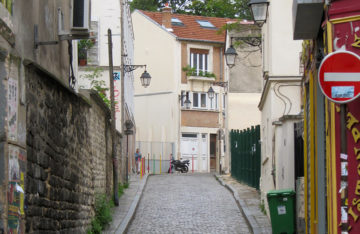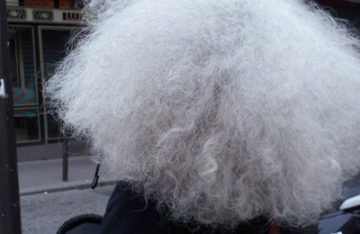 Alain ANDRÉ
Alain ANDRÉ
Extract
“The age of ten has never inspired me to write. Until now that is. At the age of ten you no longer feel the internal frenzy of childhood, but you haven’t yet started to discover your body as you will in adolescence. At the age of ten you are in an envelope, one holding the shapes you will become in the future. You look out into the world thinking you are an adult, but your feet are squashed in your size-too-small shoes. Childhood survives in your voice and the toys you have neglected but haven’t yet thrown away (…). In this temporary body were the emotions and the anger of your revolutionary years; in Latin was the origin of the Romance languages; in the volcano craters were the mountains I would clamber up. In the recent rubble of wars was Bosnia. This I would experience. In the final year of the 20th century Italy bombed Belgrade. This I would appreciate, peering out of the hotel window with its view of the Danube and the Sava.”
Our suggestion
It happens on page 26 of Erri de Luca’s most recent book I pesci non chiudono gli occhi [Fish don’t close their eyes] (2011 and Gallimard, 2013, for the French translation: “Les poissons dorment les yeux ouverts”). The story focuses on a very specific time in life, the end of childhood, reached when we are just ten years of age. For the author, this moment coincided with a summer spent on an island off the coast of Naples. An autobiographical story frames a love story that frames a coming-of-age story that frames a self-portrait of the 60 year old writer. Growing up is a matter of Russian dolls, except in this case the matryoshka is a small muzhik. At the end of the latest Imprimerie Floch notebook (with its 13 generous white pages), I made a list of my memories of that age: the village of Fontenille, my teacher father etc. Could you draw up an inventory of images from that precise moment in your life? And then choose one and write about it, in as much detail as possible, so that you can unravel it into a brief “scene” or a short story (one side of A4 maximum)? And then share it with us?
Reading
Erri di Luca was born in 1950 in the working class district of Montedidio in Naples, where his family had been rehoused. He grew up in an oppressive environment, which was improved by trips to the island of Ischia. He spoke Neapolitan to his mother and Italian to his father. At the age of 16 he declared himself a Communist. During his studies in Rome he changed his name from Harry (he was named after his American grandmother) to “Erri” and started to get involved in the extreme left-wing movement Lotta Continua. As one of the leaders he found employment at Fiat in Turin, where he worked until the failure of the political movement in 1980. He then had various temporary jobs.
He devoted his mornings to studying the Bible and his evenings to writing. His first work appeared in 1989; it was translated into French by Verdier and then by Rivages in 1994 as Pas ici, pas maintenant [Not here, not now]. The following novels and short stories have been translated into French: Alcide, arc-en-ciel [Alcide, rainbow] (Rivages, 1994), Tu, mio [You, my] (Rivages, 1998),Trois chevaux [Three horses] (Gallimard, 2000), Montedidio (prix Fémina étranger 2002, Gallimard), Le contraire de un [The opposite of one] (Gallimard, 2003), Sur la trace de Nives [On the tracks of Nives] (Gallimard, 2006), Le jour avant le bonheur [The day before happiness] (Gallimard, 2010) and Le poids du papillon [The weight of the butterfly] (2011). His Bible studies have resulted in the following essays, published in France by Gallimard: Un nuage comme tapis [A cloud as a carpet] (Rivages, 1994) as well as Noyau d’olive [Olive Stone], Comme une langue au palais [Like a Language at a Palace], Au nom de la mère [In the name of the mother]. His remarkably economical use of language, his openness towards different languages and the breadth of topics he tackles make him one of the greatest European writers of our time. I devoured Fish don’t close their eyes, covered the final blank pages in notes and started the book again, da capo. Everything in this text is as though carved out of wood. There is not a word too many, not a chip in the wrong place. The sculptor knows how to use his tool. Sculpting the material of this specific age, the age when children’s bodies refuse to get trapped in adult aspirations. Fishing in the sea, reading, playing intellectual games – then a “girl from the North” arrives – and then the body, love, male rivalry, fighting, justice: the end of childhood. A story that organises as well as creates a metaphor out of an autobiographical account can be universally understood (after all, the same story could have been told by the “girl from the North”, another writing opportunity altogether). Throw yourself into this book, it is talking about you. But don’t forget that Les Saintes du Scandale [The Scandalous Saints] (Mercure de France 2013), a story throwing light on five female figures from the Bible, is also coming out at the same time.




